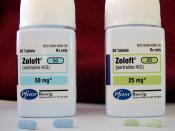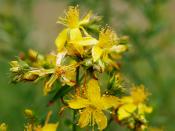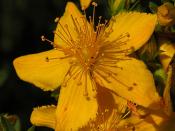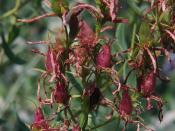1.What is it used for?St John's Wort has been used for a wide range of medical illnesses throughout history.
At the present time, St. John's Wort is mainly used as a treatment to counter depression.
Going back a hundreds of years, St John's Wort has been used to treat mental disorders and nerve pain. The ancient Greeks applied St. John's Wort to treat illnesses, and the antibacterial and antiviral qualities of St John's Wort makes it ideal also to treat wounds.
In relation to depression, studies have shown that St John's Wort is successful in treating depression ranging from mild to moderate, however not much studies have shown St John's to be able to treat long-term, major depression. St. John's Wort is also a popular depression treatment compared to other anti-depressants such as Prozac, Paxil, Elavil and Nardil as St John's Wort's presents less unwanted effects.
St. John's Wort is also used for other treatments. Used along with ginkgo and rosemary, St. John's wort helps treat viral encephalitis (brain inflammation). St. John's Wort is also used to ease ear pain from the infection in the middle ear, Otitis media. In this instance St. John's Wort is used with garlic, calendula and mulletin flower to ease the pain effectively.
Along with the aforementioned medical conditions, studies have also suggested that St. John's wort can also be used as a treatment in other medical conditions and illnesses. However, studies remain inconclusive in finding a definite answer of St. John's Wort effectiveness on medical conditions such as anxiety disorder, atopic dermatitis, obsessive-compulsive disorder, premenstrual syndrome (PMS), due to the lack of scientific evidence to recommend St John's Wort for these conditions. Furthermore, studies have also show evidence that St. John's Wort should not be used with drugs used for AIDS/HIV due to considerable undesirable effects once interacted together.
2. List some of the precautions when taking this preparationSt. John's Wort, as it is a herb, contain chemicals that can present side effects and even worse, interaction with other herbs and medications. The combination of St. John's Wort with certain antidepressants leads to overmedication, and has the possibility of increasing unwanted effects like nausea, headache and anxiety. It is also important to note that St. John's Wort is not to be used while the patient is using protease inhibitors or nucleoside reverse transcriptase inhibitors for treating HIV infection as unwanted effects of both medications interacting with each other may surface. Therefore, St. John's Wort should be used under professional advice, for example, those who are well-learnt in the field of botanical medicine. Moreover, the patient will need to be evaluated by a health care professional before using St. John's Wort to treat the problem.
The other side effects from St. John's wort typically are skin rashes, fatigue, restlessness, dizziness or mental confusion. St. John's wort can also increase the skin's sensitivity to sunlight, which is termed as photodermatitis, and thus, patients who take St. John's wort over a period of time needs to be careful being exposed in the sunlight. Typical sun-avoidance guidelines may need to be applied whilst taking St. John's wort, such as using sunscreen and wearing hats and long sleeves, and also patients may need to refrain from coming too near to sunlamps, tanning booths or tanning beds.
Women who are breastfeeding or pregnant should avoid consuming St. John's Wort due to the lack of scientific evidence that shows St. John's is effective in pregnant women or not. It is only a safety measure for pregnant/breastfeeding women to avoid St. John's Wort until further studies proves that St. John's Wort is beneficial to pregnant/breastfeeding women.
In terms of major depression, there is little if any study results indicating that St. John's is effective in treating major depression, so the patient will need to be realistic with their goals in using St. John's Wort. Also take into consideration that St. John's wort is not the best nor the only process in treating depression, and patients need not despair if the depression is adequately treated, as they can turn to alternatives like health care providers which have effective therapies available.
Also, the results of using St. John's Wort as a treatment against depression will not immediately come about, but, like most treatments for depression, the results will show after a few weeks of applying St. John's Wort.
3.List the known drug to drug interactionsPresently, there are a number of medications that St. John's Wort interacts with.
Perhaps the strongest interactions of drugs with St. John's are HIV protease inhibitors. There are strong evidence which suggest that St. John's interacts with HIV protease inhibitors like indinavir and nelfinavir, which often results in significantly decreased blood levels. Thus, it has been recommended that St. John's Wort not be used with these HIV protease inhibitors used to treat HIV/AIDS.
St. John's wort also interacts strongly with Immunosuppressive medications such as cyclosporine and tacrolimus, in which it has been reported that the effect of interaction was reduced blood levels with transplant rejection. Thus, it is also recommended that patients already taking Immunosuppressive medications to not take St. John's wort, or if the patient is already taking St. John's wort, to adjust the dose of Immunosuppressive medications as necessary.
Antidepressant medications like tricyclics, SSRIs and monoamine oxidase inhibitors also react to St. John's wort negatively. Studies have shown the worsening of side effects like headache, anxiety, and nausea to be the results of Antidepressant medications interacting with St. John's wort.
On a lesser extent, St. John's wort interacts with anticoagulant medication warfarin negatively by reducing the body's blood levels and also eroding the effectiveness of warfarin. Thus, the patient may need to adjust the doses of warfarin taken in order to maintain the effectiveness of the drug.
St. John's wort has also been show in some studies to interact with Digoxin, with the results reported as reduced blood levels in the body, and also theoretic loss of control of heart failure. More studies will need to be undertaken to understand the full extent of interacting Digoxin with St. John's wort.
The other drug interaction with St. John's wort are oral contraceptives, although the evidence at the present is rather weak. The effects of this interaction is breakthrough bleeding. It is also theoretical for the interaction to cause contraceptive failure, although there are virtually no case reports concerning contraceptive failure.
The other drugs that interacts with St. John's Wort, although based on weak evidence, are Loperamide, Reserpine, Triptans, and Theophylline.
BIBLIOGRAPHY:University of Maryland Medical Center"St. John's Wort"http://www.umm.edu/altmed/articles/stjohns-wort-000276.htm(accessed at 30/3/08)David Delvin, GP and Christine Webber, Psychotherapist"Is St John's Wort Safe?"http://www.netdoctor.co.uk/ate/depression/204971.html(accessed at 29/3/08)The Medical Team"Combining Prozac with St. John's Wort"http://www.netdoctor.co.uk/ate/depression/204900.html(accessed at 29/3/08)Alice! Health Promotion Program Staff"Go Ask Alice!: St. John's Wort"http://www.goaskalice.columbia.edu/1348.html(accessed at 29/3/08)Toronto General Hospital: Unversity Healthnetwork"Risk of Drug Interaction Between St. John Wort (Hypericum perforatum) & HIV Medications"http://www.tthhivclinic.com/stjohnswort.html








